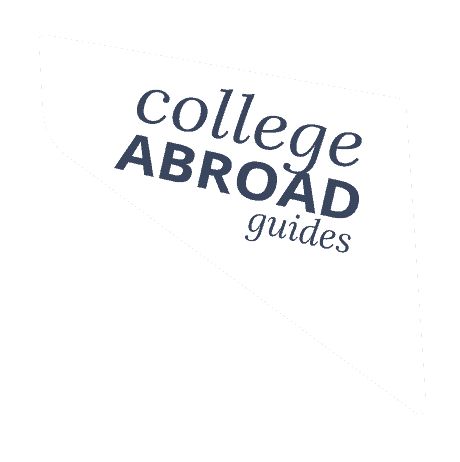Get a Futuristic Liberal Arts and Science Degree at Erasmus University College (EUC)

- Originally published
- Last updated on July 24th, 2023 at 12:54 am
Table of Contents
Heavily bombed in WWII, Rotterdam has started from scratch before. Today, EUC students inherit the city’s mindset to think ahead and focus on new ideas in order to grow.
Students worldwide look to Erasmus University College for its gorgeous historical classroom building that links Rotterdam’s history with its bustling and vibrant position as an economic giant today.
With various classes and specializations, Erasmus is a bit like its campus: a mix of old and new, a tribute to the multidisciplinary, complicated, and messy ways it encourages students to think about the world and its problems.
We’re digging into what makes this urban gem a great place for some students to build their own futures.
Basics
Associated with: Erasmus University Rotterdam
Degrees: BA, BSc
Concentrations: Social Sciences (Sociology, Psychology, International Law, Political Science & International Relations), Humanities (Humanities, Cultural Analysis, Political Philosophy & Critical Theory), Economics and Business (Business, Economics, Economics, Business, & Society), Life Sciences (Life Sciences, Molecular & Cellular Biology, Neuroscience, Pre-Med), or a combination (Sustainability, Public & Global Health, and Philosophy, Politics, & Economics,). EUC students pick a specific major within the greater departments of liberal arts & sciences, so EUC can be said to offer a broad array of majors, with 3-4 choices in each bigger department.
Location: Rotterdam, South Holland
English: Yes, the entire program
Cost for out-of-European Economic Area (EEA): €12,500
On-campus housing cost: €683 in the modern, renovated office building LUCIA, 12-month contract, plus a registration fee. There is also a monthly €45 tax for Rotterdam residents.
FAFSA funds: No
Abroad from abroad: Yes, there is a third-year exchange semester built into the program, with ~50 exchange partner universities across the globe to explore.
Student body: ~650 total students with ~40% Dutch high school graduates, 40% EU, and 20% non-EU
Five adjectives: eclectic, vibrant, welcoming, modern, transformative
Erasmus University College Ranking
U.S. News ranks its parent university, Erasmus University, #65 in the world. That’s an incredible rise to fame for an institution that didn’t exist in its current form until 1973, when its schools of medicine and economics merged.
However, Erasmus’ ranked departments are likely not the ones that University College students plan to benefit from: cardiology, clinical medicine, cardiac and cardiovascular systems, endocrinology, gastroenterology, and immunology are all ranked highly.
But so is economics.
And that’s appealing to plenty of internationally-minded business students who seek high rankings and an intimate university college atmosphere.
Is it Hard to Get into Erasmus University College?
Erasmus doesn’t publish an easily accessible accounting of its total applications, but typically, all top university colleges are selective programs, inviting some applicants to interview, and accepting even fewer, on average, between 30 and 60% of applicants.
That said, American students tend to see Dutch programs are “easy” to get into compared to their comparably high-ranked U.S. schools. In the Netherlands, getting in is often easier than staying in. And in University Colleges, where the workload greatly outstrips that of a “regular” university degree, students have their work cut out for them.
Erasmus staff state that they are excited to welcome students based on a holistic understanding of the candidate, not just their grades, and their enthusiasm for this unique liberal arts program.
Is Erasmus University College Good?
Yes, Erasmus University College is excellent. Its parent university is highly ranked, and EUC is a rigorous honors college within that respected university.
Students flock to university colleges because they want a heavy workload and an honors experience. While many tell us the work is nearly impossible, they almost always say the teaching and learning are outstanding, and they value their education as more than just good, calling it outstanding.
Modern Rotterdam is for Experimenters
What is unique about Rotterdam is that it has rebuilt without much nostalgia for what came before.
Starting new has helped Rotterdam’s experimental set show off their architectural iconoclasm. Rotterdam is also home to the 1970s cube houses that coalesce into a kind of forest, crossing their own pedestrian bridge over the road, as their living spaces dangle above. An experimental art museum also helps cement Rotterdam’s second act as a center of design. It’s the first museum in the world to put its entire collection on display.
This makes Rotterdam’s vibe avant-garde and futuristic (check out the floating tree forest). It’s been called the Brooklyn of the Netherlands and the Dutch Berlin for its underground, industrial clubs, and arts culture.
“Rotterdam is super international. It is big but not too big, and the campus and housing are amazing. I did not fall in love with the city when I visited it for the first time because I felt it was kinda industrial and big. But I definitely have grown to love it now.”
Rotterdam is also special among Netherlands cities because it feels fairly American — Rotterdam’s modern urban planning was created long past medieval street plans common elsewhere in the Netherlands. Here, you’ll see broad boulevards. Wider roads bring more cars, and an empty city business district has enabled the building of giant glass skyscrapers.
However, you’ll still find Dutch staples here: cycle lanes, pedestrian squares, and well-developed public transportation.
Get out in Rotterdam
While not known as a student town, Rotterdam has an energetic nightlife.
The Oudehaven (Old Harbor) is lined with restaurants and bars, with waterfront terraces open in the summer. One international student says they often host events and that can be a good way to meet people. The mix of bars makes it easy for students to flit between them, enjoying the waterfront and looking for students they know, while meeting new ones from Rotterdam University, EUC’s parent university with many more students.
Club Vie is across the water for dancing.
Club Vrienden has tables where you can hang out with friends, but still enjoy live music.
De Après Skihut offers no such chill option. Come here if you want to stand on a table in lederhosen.
Prefer communing with nature?
Whenever there’s sun, students go to the lakes and parks, says one current student who emphasizes that the Dutch know how to appreciate the little good weather they get.
You can also see the city’s natural side in the middle of Rotterdam at the Schoonoord Historical Garden. Pass through its gates and pretend you have your own private 19th-century grounds, strolling through the chestnut trees and onion fields.
Students emphasize that appreciating Rotterdam is key to belonging at EUC. Those who want a smaller or more traditional Dutch town won’t be happy here. However, Rotterdam does offer “something for everyone,” and students find its culture open and welcoming to all.
Campus in an International Hub at Erasmus University College
Although Rotterdam emerged from the war with a new face, EUC maintains its historical European roots.
The EUC building is a pre-war, red brick landmark that was the original library of Rotterdam.
Though it did lose its tower in the war, the city lovingly restored the building. If you ever wanted to attend college in a museum-like atmosphere with plenty of old-world columns, wood, and marble alongside bright glass expanses, this is the campus for you.
“It is a multicultural university in an active and international city…you meet people from different studies and all parts of Europe.”
Past the marble entrance hall, you’ll find wide-open common areas, a cafeteria for students, and lecture halls that have a modern twist.
Problem-based learning (PBL) rooms are small in order to facilitate discussions, and seminar rooms overlook the Nieuwemarkt pedestrian square. It’s a lively neighborhood and a cocoon for University College students who have a greater sense of tradition and identity compared to the students accepted to its parent university, Erasmus.
Living in Student Accommodation in the Dorm
First-year students must live in LUCIA, a residence hall ten minutes by bike from the classroom building. LUCIA guarantees private rooms with a private kitchen and bathroom in a large, square, concrete building above shops in central Rotterdam. Rooms are new and feature either a Murphy bed or a loft.
The possibility of housing all students in LUCIA doesn’t always go smoothly.
However, if you’re in, common rooms are uninspiring, and the newness and institutional furnishings of the residence seems to suck a little of the life out of them.
However, modernists can rejoice. One current student says that overall, the modern dorms are “amazing” and she really relished the separate classroom and dorm spaces, saying she was happy to have the chance to experience a typical Dutch education, biking to class from a separate dorm.
Second and third-year students must move out and find their own accommodation.
Cost of Living and Life Outside Campus Accommodation
While Rotterdam is a more expensive city in the Netherlands, it is also quite large, with multiple housing units available and social media groups helpful in locating student accommodations.
There are a few rooms available in partner accommodations for second and third-year students, but for the most part, the college helps by providing the names of agencies where students can find a place. Students typically live together in studentenhuizen, or student houses, or shared apartments in their second and third years.
Students say they appreciate their first year in the LUCIA building, which gave them strong ties to others in the program, as well as a sense of who they’d like to live with when they move out. There are group dinners and a group chat. Students know one another by face, if not by name.
“I fell in love with the open-mindedness and down to earth mentality of EUC. My first impression was great, but when I then participated in an Experience Day, I fell in love with the college and immediately felt at home.”
Unique to EUC, there is a “personalized development track” at EUC, where small groups of first-year students can convene to work on personal goals like resilience, budgeting, and other practical skills.
Down to Business with Academics at Erasmus University College
EUC started in 2013 with just 85 students in four majors: Economics and Business, Humanities, Life Sciences, and Social & Behavioral Sciences.
You can combine majors and choose two main focus areas. It’s grown to be the largest university college apart from AUC, but caps enrollment at around 210 students each year. That’s just because more students simply can’t fit into the college’s close-knit freshman housing.
Erasmus is unique in that there is no other honors college with an economic and business emphasis, borrowed from Erasmus University, though there is no preference for business and economics students.
The business degree has robust, wide-ranging course offerings that appeal to many applicants. It is also possible to complete a 5-year double degree here with the arts and music school. Students say humanities are also strong.
“Everyone is there for and supports one another.”
Problem-Based Learning in Class
Along with UC Maastricht, UC Venlo, and UC Twente, Erasmus University College uses a problem-based learning approach to teaching, which many students said convinced them Erasmus was the place for them.
“I absolutely love the problem-based learning style. It makes it easy to participate and learn so much more.”
The system focuses on a real-world problem. Students work in groups of 10-12. Everyone participates, and the group considers and explores all viewpoints.
The approach has its detractors. “You can see some students go through the shock of it,” says one international student, saying there is always a small group of first-year students who dislike the approach. “It’s something you have to get used to,” she says.
The kind of student who won’t adapt to PBL is the student who wants to zone in and out during classes, taking notes and absorbing things passively.
Mining the Course Catalogue at EUC
At EUC, there are ~120 courses across all five majors, with a required interdisciplinary core curriculum of nine courses taken during the first year, like “Big History,” “Scientific Practice: An Invitation,” “Quantitative Research Methods & Analysis,” and “Modernity.”
The first year is general, and then students can decide to do a major and a minor, or spend some time taking lots of different kinds of courses for an even broader experience. There are multiple minor tracks available like “Visual Cultures & Media Literacy,” “Work & Organizations,” or even “Contemporary Global Order.”
Third-year students can do a semester exchange with partner universities on six continents, so they can study abroad from Indiana to Oceania, before coming back to work on a capstone project their final semester.
The biggest drawback can be the intense honors environment of Erasmus University College. It’s fostered by a bunch of highly ambitious students attempting to conquer an exceptional workload.
“What they do is fit the program into three years, and you’re kind of just dying for three years.”
While the students are competitive, and some say the “second year is when everyone has their breakdown,” there is a culture of collaboration and camaraderie among students in an academic environment with no curve.
The Application Process to Study at EUC
EUC has a minimum GPA of 3.0 for American high school grads without an IB diploma, and four AP exams with a minimum score of 3, one of which is Calculus AB or BC. You can substitute an OMPT-A math test with a 60% score for the Calculus requirement.
OMPT-A is an online, proctored, 2-hour test with algebraic concepts, including linear and quadratic equations, functions, exponential and logarithmic functions, and differentiation.
For those with IB diplomas, math scores should be 5 for Mathematics: Applications & Interpretation HL, Mathematics: Analysis & Approaches SL, or 4 for Mathematics: Analysis & Approaches HL.
SAT and ACT scores can be substituted for GPA requirements. You’ll also submit a motivation letter, and if you score an interview, you can share your goals, ask questions, and see if the school is a fit.
The regular deadline is January 15 for Fall 2022 and May 1 for late applications.
Funded through the Dutch Ministry of Education, Culture, and Science, a Holland Scholarship assists students for whom study in the country wouldn’t be otherwise possible.
It’s for non-EU students who demonstrate financial need and is granted just once in the amount of €5,000. Applications can be submitted at the same time as program applications.
Explore More Programs
University colleges are all liberal arts programs, but they come with different program specialties, residence requirements, tuition, and rankings. Learn how to decide between them and some of the basics of going to university in the Netherlands.
Related Posts

Jessica Share
Jessica is the writer, Ph.D., and mom-of-an-abroad-student-in-the-UK at the helm of College Abroad Guides. When she's not asking college students where the coolest place to hang out in their city is, she's figuring out how she can make $60 imported Greek oregano potato chips and £50 British bacon potato chips appear on her doorstep for the cost of a local bag of Lay's.





